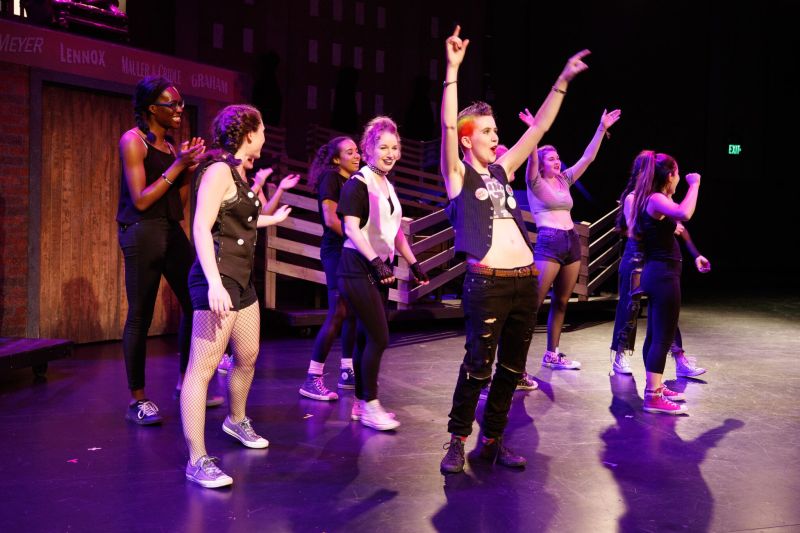Corrupt business, abject poverty, and punk rock fill the stage of TAP’s entertaining and powerful production of “St. Joan of the Stockyards,” playing at Roble Studio Theater through Sunday. An all-female cast adapts German playwright Bertolt Brecht’s 1931 play about capitalism, spirituality, and the masses, productively reminding us of the ways in which power, business, and religion were, and are, deeply gendered. Director Jessi Piggott adeptly brings an old, yet eerily timely, play to the present moment, animating the stage with studded chokers, dyed hair, and black lipstick.
“St. Joan of the Stockyards,” set in an early 20th century Chicago meatpacking factory, follows ruthless tycoon Pierpont Mauler (Lillian Bornstein ‘18), a meatpacking plant owner with a pseudo-soft spot for suffering. As Mauler increasingly manipulates the market, cunningly signing predatory contracts, buying up all the cattle, and consulting with his powerful friends in New York, the factory doors close. In this high stakes battle amongst the corporate elite, ten-of-thousands of factory works suffer; kicked to the curb, the masses line the streets, hungry, cold, and dehumanized in an unforgiving Chicago winter.
In the midst of this economic, spiritual, and humanitarian crisis, we meet Christian charity worker Joan Dark (Gianna Clark ‘19), a member of The Black Straw Hats. The group feeds soup to the poor and tries to the guide the uninterested workers toward God. But as Joan realizes the organization is complicit in the exploitation and greed of the meatpacking elite, she abandons the group, instead going to the streets to help fight for the workers. Using her conscience as guide and leveraging her influence with Mauler, Joan takes on the business and faith establishment.
The morbid drama is elevated by brave and undeceived performances from the ensemble, and occasional injections of dark humor, particularly from Sullivan Slift (Ezra Jackson-Smith), Maulers sadistic broker, negotiator, and confidant. The engaging performances are complemented by an innovative production team. The dynamic set, cleverly designed on wheels by Nora Kelly ’19 and Erik Sunderman, is frequently moved by the actresses during inter-scene songs. A symbolic cow rises and falls in the background to represent the changing market prices. Clever costumes allow actresses with multiple rolls to seamlessly transition from top-hat to ragged cloak. And a live band (Dylan Grosz, Megha Makam, Sera Park), doubling as the headquarters for labor organizing, supplements the production with a rebellious pulse.
The Marxist play is fiercely critical of the brutality of business and the corruption of religious organizations, yet offers little hope that the exploited workers or political organizers have any power to change their plight. Brecht’s words read as deeply cynical. His disdain for the manipulative factory owners trickles down to the helpless workers as well. Character after character is paraded across the stage as an example of just how baseless, corrupt and immoral human being have become. Evil is everywhere. In these moments, the play feels overwhelmingly alienating.
While the script is laced with helplessness and devastation, the ensemble provides hope and offers a solution. As the audience walked into the theater, we were greeted by cast members offering free temporary tattoos, hair clips, and tampons. Here were resources being gifted in good faith, a random act of kindness, restoring both giver and receiver to a shared humanity. This, perhaps, was the world Brecht hoped for, but could not imagine. Through this small pre-show gesture and their spirited adaptation of the play, the cast of “St. Joan of the Stockyards” modeled the type of actions we so desperately need in our art, politics, and social interactions: to move beyond criticism and toward constructive, creative, and more human futures. The production transforms the morbidity of Brecht’s original manuscript into a kind of celebration—of feminine power, of communal strength, and the rebellious nature of the human spirit.
Contact Alessandro R.L. Hall at ahall2 ‘at’ stanford.edu.
This article has been updated to reflect students’ current identities.
